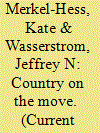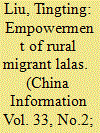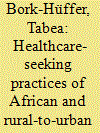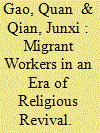|
|
|
Sort Order |
|
|
|
Items / Page
|
|
|
|
|
|
|
| Srl | Item |
| 1 |
ID:
086887


|
|
|
|
|
| Publication |
2009.
|
| Summary/Abstract |
In Leslie T. Chang's 2008 book Factory Girls:From Village to City in a Changing China. the former Wall Street Journal reporter notes that the 130 million people on the move in China today represent the largest migration in human history, three times the number of people who immigrated to America from Europe over a century.
|
|
|
|
|
|
|
|
|
|
|
|
|
|
|
|
| 2 |
ID:
167386


|
|
|
|
|
| Summary/Abstract |
In today’s China, women’s social roles continue to be rigidly associated with gender-based responsibilities that include defending the integrity of their family, entering into heteronormative marriage, and showing reproductive capabilities. Most of those who self-identify as lalas (lesbians) struggle with such issues as self-shaming emotions, disclosing their homosexuality to family members, friends, or colleagues, and dealing with family and social pressures. Within this context, I investigate queerness in a group of young Chinese rural migrant lalas working and living in the industrial area of the Pearl River Delta economic zone in South China. I draw two conclusions. First, rural-to-urban labour migration empowers rural female lalas by providing a measure of economic independence and an escape from patriarchal and homophobic family relations. Second, the integration of traditional (offline and face-to-face) socializing locations and emerging virtual communicative spaces plays an important role in the process through which possibilities of living a queer life are carved out.
|
|
|
|
|
|
|
|
|
|
|
|
|
|
|
|
| 3 |
ID:
143103


|
|
|
|
|
| Summary/Abstract |
Taking the examples of Chinese rural-to-urban migrant and African migrant businesspeople in Guangzhou, this article inquires into the commonalities and differences in the health status and healthcare-seeking practices of both groups. While both populations of migrants are diverse and heterogeneous, there are many commonalities with regard to the challenges they face compared to the Chinese local population. Mixed-methods research frameworks and qualitative and quantitative methods were applied. While existing publications emphasise lacking financial access to healthcare, further individual and social factors account for migrants’ healthcare choices. Their access to healthcare can be improved only by introducing insurance schemes with portable benefits, providing localised and culturally adequate health services adapted to migrants’ specific needs and health risks, and enhancing patient orientation and responsiveness by health professionals.
|
|
|
|
|
|
|
|
|
|
|
|
|
|
|
|
| 4 |
ID:
173458


|
|
|
|
|
| Summary/Abstract |
In the reform era, China appears to be caught in a contradictory dual process – the entrenchment of secular values and simultaneously, the notable revival of all forms of religion. However, the existing literature has achieved limited success theorizing how the thriving of faiths constitutes, and co-evolves with, secular modernity and capitalism. This article contributes to this re-theorization by bringing migration, labour and industrial capitalism to bear on faith and religious practices. Our empirical study in Shenzhen focuses on the formation of rural-to-urban migrant workers’ Christian faith. We examine the ways in which migrant workers manoeuvre religion as a cultural, symbolic and discursive resource to come to terms with, but also sometimes to question and counteract, the double exploitation enforced by state regulation and labour relations. In the meantime, however, this article also argues that migrants’ efforts in self-transformation through the discourses of benfen and suzhi, and their theologically mediated interpretation of alienation, labour exploitation and social inequality, overlap with, and reinforce, the agenda of producing docile, productive bodies of migrants, an agenda endorsed by the state–capital coalition. This research opens new opportunities for theorizing how capitalist secularity and religious orientation implicate one another in the current Chinese society.
|
|
|
|
|
|
|
|
|
|
|
|
|
|
|
|
|
|
|
|
|